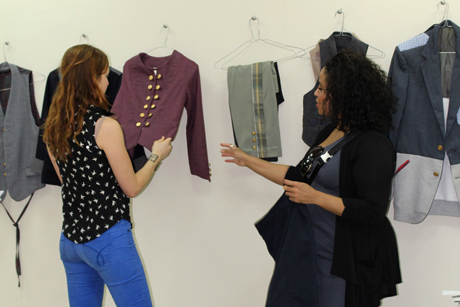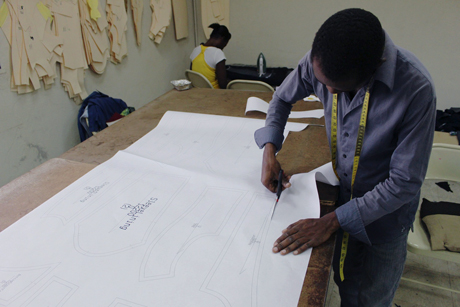Cornell experts help make old clothes new again
By Ted Boscia


Cornell fiber scientists and fashion designers, working with a Canadian apparel company, are making sustainability chic by refashioning old clothes found in Haitian secondhand markets into hip new threads.
Funded by the U.S. Environmental Protection Agency, three professors and four students are helping Toronto-based LB Designs improve its methods to dismantle discarded clothing and use the pieces to create pants, shirts, jackets and other professional wear for young men and women.
Known as fashion upcycling, this process diverts heaps of clothes from landfills and provides fair-wage jobs to Haitian tailors under humane working conditions. To explore upcycling on a mass scale, the Cornell team and LB Designs seek to streamline the design and manufacturing process, aiming for zero waste by eliminating or reusing leftover scraps and threads.
“There’s a growing demand, especially from young people, for clothing that is produced ethically and sustainably,” said team leader Tasha Lewis, Ph.D. ’09, assistant professor of fiber science and apparel design (FSAD) in the College of Human Ecology. “This partnership gives our faculty and students an opportunity to apply their knowledge and creativity directly to a sustainability challenge.”
In 2011, the United States discarded more than 13 millions tons of textile waste, according to the EPA. About 2 million tons were recycled, much of it eventually shipped in bales to more than 250 nations, including Haiti. Even then, it may still go unworn because the clothes are often too large to fit properly.
“Fashion upcycling has great potential considering how much clothing goes into landfills,” said Lewis, who studies fashion’s global supply chain.
So far, the Cornell group has used body scanning equipment and computer design tools to digitize the company’s design patterns. This allows LB Designs to preview the shape and fit of garments, come up with standard sizes and avoid fabric waste from traditional prototype development methods. They have also improved efficiency by developing a garment database to track color, brand, style, size and other characteristics of items purchased from Port-au-Prince’s secondhand markets.
To move closer to zero waste, Cornell’s experts hope to reuse clothing scraps in new ways. FSAD professor Anil Netravali, who studies fiber composites, thinks one solution is to “fiberize” the leftovers into stuffing for pillows, packaging or lunchbox insulation, for instance.
“We refer to our Cornell partners as our dream team,” said Anne Pringle, LB Designs co-founder, along with Consuelo McAlister. “We are constantly being exposed to ideas and processes we didn’t even know were possible. The combination of fiber scientists and apparel designers is ideal for improving our process.”
But challenges remain – mainly how to reuse synthetic blends that are harder to upcycle than natural fibers and can release toxins into the ground after they are discarded.
Still, the team is undeterred.
“On a large scale it is difficult to pull off, which is why I find this project so interesting to work on,” said FSAD graduate student Helen Trejo, who wrote an undergraduate thesis on upcycling. “It feels like we can make a big difference.”
Lewis visited Port-au-Prince for the second time in January to observe its secondhand markets and the LB Designs factory. With support from a Mario Einaudi Center for International Studies’ travel grant, she’s writing a case study on the company’s approach and whether its methods can be transplanted elsewhere.
“The fashion industry has a spotty track record on environmental issues, but this project shows how processes can be improved to eliminate waste,” Lewis said. “And by working with local partners in Haiti, it’s giving opportunities to a country with a long history of skilled apparel production.”
Ted Boscia is director of communications and media for the College of Human Ecology.
Media Contact
Get Cornell news delivered right to your inbox.
Subscribe